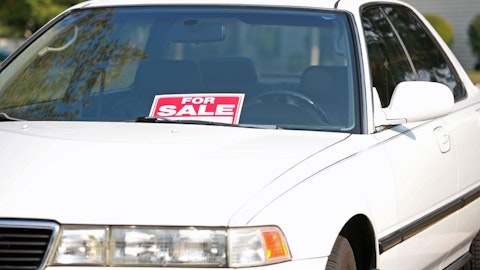It’s not just the competitor that you have in mind, but it’s all the other possible outcomes for vehicles, whether it’s repair, owner retention, sale through other auction platforms, hand-selling, retailing, from the perspective of our rental car customers. We define that competition very expansively. But nonetheless, the five principles are – or the five priorities are delivered auction returns, the service that we provide to our sellers, as measured in our ability to recover vehicles, in some cases from very difficult circumstances, our ability to process titles efficiently, and to provide them with the tools they need to make better and faster decisions. The third element I’d cite is the service we provide to our clients’ clients. So, in the case of insurance, to the policyholders to whom we believe we provide a differentiated title retrieval and loan payoff process today, with the gap widening over time as well.
Fourth, I’d say is the ability to do all of the above, both in the ordinary course, as well as in an extreme weather event, to gracefully manage all of these processes, even if volume again spikes ten-fold or twenty-fold in a given period of time in a given region. And then fifth, and I think this is more esoteric, but I think it’s real, is the assurance that due to our land ownership, our technology platform, our people and culture and capital structure, that we’re here for the long haul, and that when we make promises, we will absolutely deliver on them. So to your narrower question about the auction returns, I do believe the gap is substantial. I do believe that it’s growing. Now, it’s difficult to quantify, because no given car is ever transacted on multiple platforms, right.
The car sells here or it is sold at a rental car retail lot, or it’s sold at a different auction house. And so a true, perfectly apples-to-apples comparison in a given moment is difficult. But I think the evidence, the preponderance of the evidence based on seller behavior over the years, is yes, that we deliver superior economic outcomes, in large part due to better auction returns, but also to the service elements that I cited a moment ago.
Daniel Imbro : Understood. Have to try sometimes. And then maybe a follow-up on the non-insurance side. You’ve gained, obviously, a lot of market share in the last few years. Into ‘24, obviously that wholesale volume backdrop should improve just as we look across dealer or commercial. I guess, can you talk about incremental cost to serve? Are those vehicles any more cumbersome on the income statement, as you think about any selling costs associated with that volume or would it be a similar kind of incremental flow-through, as we think about just typical insurance volume?
Jeff Liaw: Individually, they are not materially different. I think to serve financial institutions, there are certainly a different level of compliance and certain different processes. So it’s more like when we choose to emphasize a new type of seller, we have to develop certain capabilities of equal disclosure and otherwise. So it’s not per se volume-driven. It’s more just the nature of the sellers that we’re targeting. I think by and large the categories we’ve now all touched, so I don’t think the contribution economics are materially different.
Leah Stearns: And, Daniel, I would just add that we’ve spent a lot of time over the last 12 months developing the capabilities across our technology platform to address some of those needs. So the sale as I talked about arbitration policy that is now available at Copart, those are all items that are more familiar to our Blue Car seller – or sorry, the members who are purchasing those Blue Car units. And so we’ve been forward-thinking about preparing ourselves for that potential future demand.
Daniel Imbro : Great. Thank you both for all the color and best of luck!
Jeff Liaw: Thanks, Daniel.
Operator: Thank you. Next question is coming from Bret Jordan from Jefferies. Your line is now live.
Bret Jordan : Hey, good afternoon, guys.
Jeff Liaw: Hey, Bret.
Bret Jordan : On the international side, could you talk a bit more specifically about what you’re seeing in the EU? And obviously Germany, Finland, Spain have been potentially large growth markets. Could you address those?
Jeff Liaw: Yes. And I’ll separate Finland for a moment. Finland is frankly more like the UK, Canada, and the U.S. and that that has long been a gross settlement market in which insurance carriers simply pay the owner’s PAB or ACB, the intact value of the car, and then they can sign that vehicle to the salvage auction. So we acquired that salvage auction some years ago, and the business is trending well. Some of the same underlying trends that you expect here – rising total loss frequency with a dip during the COVID-19 period when vehicle prices skyrocketed. But otherwise, fundamentally similar, though fundamentally, of course, not a huge population or a huge market in and of itself. Then the UK, I’ll set aside as well. That mirrors the U.S. in some regards, obviously some noise from Brexit and otherwise.




